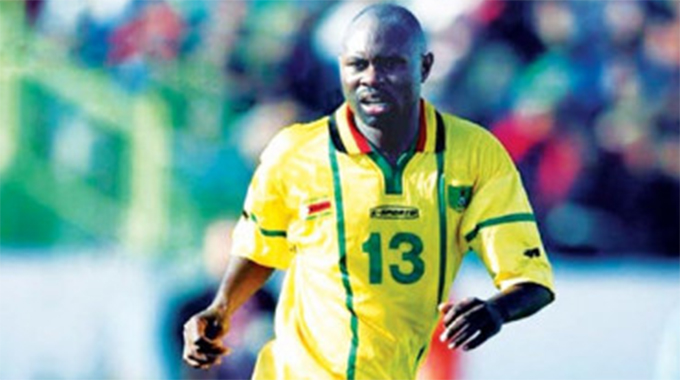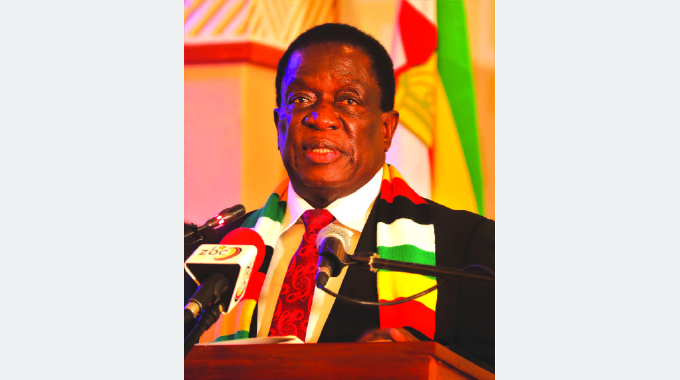In a way, it’s about remembering Adamski

Sharuko on Saturday
IT’S hard to imagine that, in December this year, we will mark a decade since Adam Ndlovu died in that horror car crash in Victoria Falls.
Time, indeed, flies.
After all, it still feels like yesterday, when news of the tragic crash, which devoured the life of one of the greatest forwards to grace our fields, first filtered through.
There is a reason why the painful, and cruel ending, to Adamski’s life adventure, still hurts.

Adam “Adamski” Ndlovu
He was just starting his journey as a football coach and, even though he was still in the early stages of his career, there was no questioning he was destined for the stars.
A potential coach for his country, for his Warriors, the team he had served with distinction, from his days in the Dream Team, to the romance of an appearance at the Nations Cup finals.
He actually scored at our maiden appearance at the AFCON finals, writing his name in gold letters, to be remembered by generations to come, given the goal came in a landmark match.
For the record, the goal came in the first match we won at the Nations Cup finals, against the Desert Foxes of Algeria, in what was confirmation of our arrival on the big stage.
In terms of goals, that breakthrough tournament for us turned into a festival for the boys from the City of Kings, Adam’s hometown.
His brother Peter scored three of the six goals, which means half of our tally, at that tournament.
Esrom Nyandoro and Joel Luphahla, who are also boys from the City of Kings, scored the other two goals.
As fate would have it, Adam’s death came exactly 20 years after he almost landed the biggest career move by a Zimbabwean in-field footballer.
In 1992, Adamski found himself training with Manchester United stars as Sir Alex Ferguson searched for someone who could provide the Red Devils with the X-Factor upfront to transform them into champions.
A quarter-of-a-century had come, and gone without United winning the league championship and, in their desperate hour of need, it will always be an honour to Adamski that he was one of the options Sir Alex tried.
The other was a French magician called Eric Cantona.
Fergie settled for the French genius and, as they say in this game, everything is now history as this provided the Red Devils, with the missing link, required for their dominance.
Adamski was only 42 when he died.
He would have been 52 this year.
Well, that’s exactly my age, and it should explain to you why his tragedy has always had this personal impact on me.
Eight years after Adamski’s death, Highlanders once again were plunged into mourning, when Richard Choruma died in Tembisa, South Africa.
While Richard didn’t have the same massive profile that Adamski had, there is no doubt he was one of Bosso’s finest sons in the era of the new millennium.
Ironically, just like Adamski, Richard was just 42, when he died.
Wherever life took him, Richard never forgot the life and times of his amazing experience at Bosso.
“The years I spent at Highlanders were the best ever in my football career and I will forever cherish them,” he once told a local newspaper.
“The midfield was always the engine room that drove Highlanders and made us win all those trophies. We were just uncontrollable and no team could stand against us.
“Eddie May, remains my best ever coach. He was a great tactician and motivator and with him, we could beat anyone. He always believed in his players and that made it easier for us to play for him”
The Welshman was in charge of both Adamski and Choruma in that great Bosso team which won the league championship in 2002.
Ironically, just like Adamski, the Welsh coach would be dead just 10 years later in April 2012.
He was 68.
May was mourned in Bulawayo, for his services for Bosso, as much as he was also mourned in Cardiff, where he left a huge impression during his four-year stay at Cardiff City.
In 1992, when Adamski was having trials at Manchester United, May was starting his four-year adventure at Cardiff City, in which he would become a folk-hero.
The fans nicknamed him ‘The Ayatollah,’ and, in his first season in charge, he led the Bluebirds to the Fourth Division title, becoming only the second coach to lead the club to a divisional title.
The last one, Billie McCandles, had done that in 1947, in Division Three.
May’s other highlight, in charge of the Bluebirds, would come with a success story over Manchester City, whom they knocked out of the FA Cup.
THE BOSSO ROADSHOW WAS IN FULL CRY
As fate would have it, in July this year, 30 years to the month and year when May arrived at Cardiff City, the club’s Zimbabwean connection, added a new chapter.
Zimbabwean midfielder, Andy Rinomhota, joined the Bluebirds, on a three-year contract.
In the year, in which we are marking a decade since we lost Adamski, it’s not only the personal tragedy of losing one of our game’s greatest sons, which we will remember.
After all, this year also marks the 20th anniversary of a milestone, in domestic football, which has largely gone unnoticed and, in a way, without the fanfare, which it deserves.
Interestingly, Adamski was also part of that show, an amazing achievement by Bosso, which had never been done before, in the history of the domestic Premiership.
And, crucially, it has never been done, again.
That’s huge, especially when one considers that 18 seasons of the domestic Premiership have been played since that historic campaign, by the Bulawayo giants.
More than 8 408 league games have been played, in the local top-flight league, and none, so far, has managed to produce a sequence of results, in one season, to match that record-breaking campaign by Bosso, in 2002.
And, even more significantly, that Highlanders have only won one league championship, back in 2006, since that record-breaking campaign, in 2002.
I’m someone who believes that without reminding ourselves about our past, and learning from it, the mistakes we made and the right notes we touched, we can never take concrete steps going forward.
After all, our domestic Premiership is facing a real crisis, one of its biggest challenges, since the top-flight clubs rebelled against direct ZIFA leadership, and freed themselves to run their affairs.
Never, in the history of our top-light league, has it been rejected, in such a big way, by the very patronage, on which it used to ride on, as its major strength, in wooing corporate partners, into its fold.
Today, it largely resembles a shell, deserted by the fans who used to flock to its matches, and if 5000 fans attend a Dynamos match today, it’s something which will make headlines on the back pages of our newspapers.
Why?
Because the average crowd, at the Glamour Boys matches, has fallen sharply to about 1000 fans and, what’s even more worrying, is that the numbers keep falling.
What’s scary about all this is that Dynamos are the biggest team in the league and have traditionally been the club with the biggest following at their matches.
But, the majority of the people who used to flock to their matches, have long stopped being regular visitors, to the stadium and some are now seen at the Harare Sports Club, attending cricket matches.
Twenty years ago, this wasn’t the case, and no football club, in the domestic Premiership, was guaranteed a bigger following, whether at home or on the road, than Highlanders.
For many Bosso fans, these were the days of their lives.
The days and nights and the likes of Liqhwa Gama, a bigger-than-life character for whom Bosso was more than a football club but a way of life.
The days and nights when the Bosso roadshows would rock our major roads and transform them into highways of black-and-white caravans, all for the cause of Highlanders.
The days and nights when Bosso were the dominant power in the domestic Premiership, winning four league titles, on the bounce.
Helping them to finally match the longest winning sequence, when it comes to the league championship, a benchmark which their biggest rivals, Dynamos, had created between 1980 and 1983.
I still remember a banner which I saw being displayed in Bulawayo during the Christmas holiday break of 2002 because the message was simple but powerful – ‘WHAT DEMBARE CAN DO, BOSSO CAN DO BETTER.’
It’s likely that the proud Bosso fan who was flying that banner from the window of his apartment, was quite convinced that his or her team would win the championship, again, the following season.
That would have given Highlanders FIVE league championships, in a row, and this would have eclipsed the four league titles, in a row benchmark, which the Glamour Boys set in the early ‘80s.
Of course, we know that Bosso didn’t win the league title in 2003, to make it five-in-a-row, but no one can fault them for trying.
After all, the difference between them, and a fifth straight league title, was just ONE point, with Amazulu taking the honours and Bosso finishing second.
The Bulawayo giants again finished second in 2004, to champions CAPS United, won the championship in 2006 and finished second, this time to Dynamos, in 2007.
This means that, between 1998 and 2007, which is a period covering a decade, in which NINE championships were concluded, BOSSO WERE EITHER CHAMPIONS, ON FIVE OCCASIONS, AND RUNNERS-UP, FOUR TIMES.
That’s an amazing story of consistency.
TWENTY YEARS AGO, BOSSO SET A BENCHMARK
But, for me, one special season stands out in that festival of glory, cycle of success, oasis of grand achievements and island of joy.
It’s the 2002 season!
And, on the 20th anniversary of that campaign, I felt it would be unfair that I don’t provide a reminder, to our football community, of how special it was.
Especially now when we have a Premiership which is struggling for patronage, which will pop champagne bottles to celebrate a success story should one of its matches attract at least 10 000 fans.
A league which will probably give its members a holiday weekend, to celebrate a fine achievement, should at least 5000 fans venture into Mandava, to watch its best club, FC Platinum.
A league which today finds itself turning green with envy when it reads reports, and sees the beautiful pictures, of the full house at Ellis Robins on Tuesday, in a Division One match.
When a mere secondary school like Ellis Robins can provide us with a stadium, which has a turf which is better than about 90 percent of the surfaces where the domestic Premiership is being played, I guess the time has come for us to concede that our top-flight league has, indeed, lost its magic.
And, when such a stadium can attract about 3000 fans, when the National Sports Stadium is struggling to attract 1000, every weekend, then that puts into true perspective that our Premiership is sliding down the wrong path.
I met faces, who I had long met 10 years ago, at Ellis Robins on Tuesday, true football patrons, who have been forced to desert the Premiership because, they will tell you, there is no reason to go and watch a game where four passes can’t be string together.
They would rather pay US$1 to watch Division One football, rather than pay US$3, to watch the same Rooney, whom they now see playing in the lower league, in the Premiership.
But, it never used to be like that and, 20 years ago, a high-flying Bosso team touched the edges of heaven and did something, which had not been done in the league before, and which has not been done in this league since.
They were the last Bosso team to provide this grand old club, which turns 100 in four years’ time, with a Soccer Star of the Year – Dazzy Kapenya.

Dazzy Kapenya
They had Adamski, they had Shutto, they had Sizabantu Khoza, Alexander Phiri, Johannes Ngodzo, Honour Gombami, Melusi Sibanda, Charles Chilufya, Tapuwa Kapini, Bekithemba Ndlovu, Sautso Phiri, Mkhokheli Dube, Noel Kaseke.
They lost only two league games all season, one to Dynamos at home, when Norman Maroto scored the only game, and the other in Harare, when Black Rhinos won 1-0.
They conceded just 14 goals all season, at the rate of one goal in every two games, a grand achievement which can only be put into proper context when one considers that Rhinos, who finished second, lost EIGHT games.
That Bosso side finished 28 points ahead of DeMbare, who could only finish fifth, which means Eddie May’s men could have afforded to donate 26 points to charity, and still finish ahead of their biggest rivals.
It means they would even have forfeited EIGHT of the 22 games they won that season but still finish above the Glamour Boys.
But, that’s not why this was a record-breaking season for the domestic Premiership, which explains why it should always be remembered and, crucially, always be celebrated.
The special reason it’s the only campaign, in the history of the domestic Premiership, that the difference between the champions, and the chasing pack, was 22 POINTS.
This means that Bosso would have afforded to forfeit about FIVE of the games they won that season, but still win the championship.
That’s special, very special.
What about the other seasons?
In the ’93 season, Bosso finished five points ahead of CAPS United and this was the scenario the following seasons (’94 — Dynamos 11 points head of Bosso; ’95 — Dynamos same points with Blackpool; ’96 — CAPS 7 points ahead of DeMbare; ’97 — Dynamos 11 points ahead of CAPS; ‘98/’99 — Highlanders one point ahead of Dynamos).
In 2000, Bosso two points ahead of Amazulu; 2001 — Bosso three points ahead of Amazulu; 2003 — Amazulu one point ahead of Bosso; 2004 — CAPS 15 points ahead of Bosso; 2005 — CAPS two points ahead of Masvingo: 2006 — Bosso 11 points ahead of Motor Action; 2007 — Dynamos nine points ahead of Bosso; 2008 — Monomotapa two points ahead of Dynamos and 2009 — Gunners five points ahead of DeMbare.
In 2010, Motor Action and DeMbare same number of points; 2011 — Dynamos/FC Platinum same number of points; 2012 — Dynamos/Highlanders same number of points; 2013 — Dynamos/Highlanders same number of points; 2014 — Dynamos/ZPC Kariba separated by one point and 2015 — Chicken Inn four points ahead of DeMbare.
In 2016, CAPS United two points ahead of FC Platinum; 2017 — FC Platinum two points ahead of Dynamos; 2018 — FC Platinum 13 points ahead of Ngezi Platinum and in 2019 FC Platinum finished three points ahead of Chicken Inn.
For Bosso, 2002 was very special and, in a way, it’s about remembering Adamski.
To God Be The Glory!
Peace to the GEPA Chief, the Big Fish, George Norton, Daily Service, Sitting Bull, Crazy Horse and all the Chakariboys still in the struggle.
Come on United!!!!!!!!!!!!!!!!!!!!!!!!!
Ronaldoooooooooooooooooooooo!
Text Feedback 0772545199
WhatsApp 0772545199
Email- [email protected]; [email protected]
You can also interact with me on Twitter (@Chakariboy), Facebook, Instagram (sharukor) and Skype (sharuko58) and GamePlan, the authoritative football magazine show on ZTV, where I interact with the legendary Charles “CNN” Mabika, is back every Wednesday night at 9.30pm









Comments